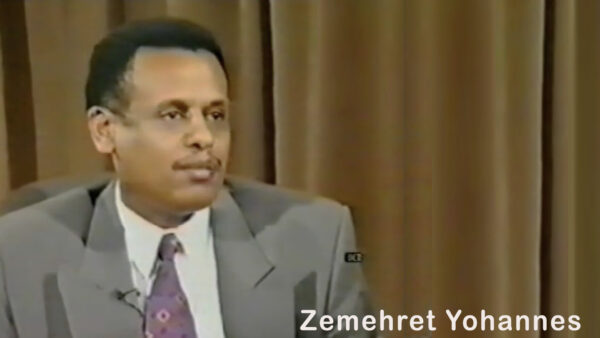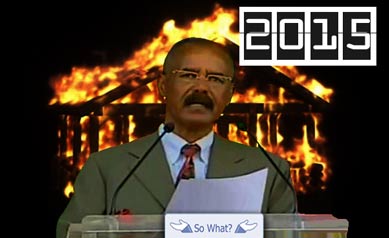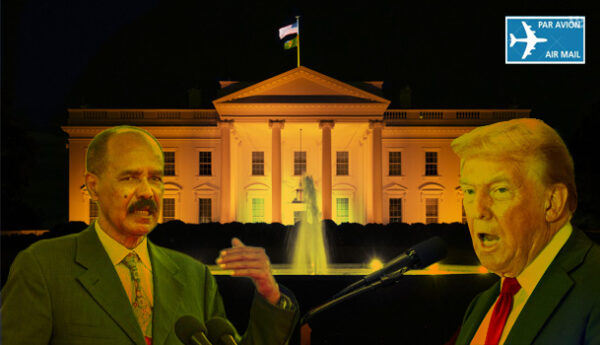Rule Of The Jungle And My Quest To PFDJ Mindset
![]()
PFDJ Structures: Its Hardware and Software Network Dissection, Analysis and Thinking Beyond
Objective of this Article: As the title indicates, it is a piece of writings that tries to explore the hardware and software component of PFDJ regime and based on available information and my personal interpretations to those matters.
Note: All writings are my own interpretations based on my experience and references available in all possible means. For any case, I am the only and only responsible person for these series. All errors, mistakes, criticisms, appreciations, and acknowledgements I do are of purely my own. Hence, I would kindly apologize for any inconveniences or misinterpretations that it may follow and at the same time I am the only one to be responsible.
General Introduction
In this article, I will try to search the hardware and software component of today’s PFDJ to make analysis that can contribute in raising the consciousness and awareness of Eritrean people in general and then to think beyond when the RIGHT OF LAW is restored to the people. PFDJ’s name is now 18 years and 11 months old. It got its name after 3rd EPLF congress held in Nakfa at the year of 1994. The people had little information regarding the evolution of this name though the first two letters were synonymous with that of [EP] LF, and little attention was paid for the later meaning of JD (Which literally stands for “[FOR] JUSTICE [AND] DEMOCRACY. This simple abbreviation for PEOPLE’S FRONT for DEMOCRACY and JUSTICE’ has all the hidden mystery that we as people are now suffering from.
Saying this as a background, historical analysis will be done on the evolution of this political system, special in connection with the EPLF (Eritrean People Liberation Front) and parallel liberation fronts that never got a chance to be heard of in the post Independence Eritrea.
Therefore, the whole topic will have a vast approach starting from the very initial historical developments of the Eritrean political skeleton starting from 1961 and with possible flash backs of the early 1940-1961 political evolution of Eritrea. But, more emphasis will be given on the working principles, policies, and strategies, organizational and frontal premises.
To do this, I will start with the basic claimed ideology of Social Justice which the PFDJ advocates in all spheres of the domestic and international out-reaches of his works.
Social Justice: A Misrepresented and Failed Ideology of PFDJ
Social justice is an ideology introduced by the ruling totalitarian bandit of EPLF/PFDJ in the Eritrean state from its early time of 1970s. This ideology was not clearly expressed during the early times of the struggle as Marxist-Leninist ideology and Socialism were tools in up-grading the social consciousness of the masses and fighters. During the last years of struggle a new approach was drafted that was thought to be adopted in a pro-independent Eritrea. In reality, this was not a conscious move as it was driven by the changing political environment of the world and political diversity of the revolutionaries. In the early years of independence, EPLF appeared more of democratic front with all promising democratic institution establishments and mixed systems of economical inclination. Such promises lead to a new hope in the political situation of the horn of Africa.
But, things came to change soon after EPLF drafted the first charter in 1994 and with the eruption of new border conflict with Ethiopia. When we closely examine the way EPLF/PFDJ runs its social, economical and security policies, there is clear observance of the social justice ideology in all spheres. In the charter adopted by the third congress of 1994, PFDJ’s vision is clearly tells Social Justice as a means to economic developments and social democracy. It states that the vision of PFDJ is to have equitable distribution of wealth, services and opportunities, and special attention to be paid to the most disadvantaged sections of society. Additionally, the Eritrean constitution ratified in 1997, in chapter 1 Article 1 (1), it is clearly stated Eritrea is a sovereign and independent State founded on the principles of democracy, social justice and the rule of law. And Article 8 (1) of the Economic and Social Development states the State shall strive to create opportunities to ensure the fulfillment of citizens’ rights to social justice and economic development and to fulfill their material and spiritual needs.
Therefore social justice is a principle that was outlined in achieving the vision of PFDJ in building Eritrea according to the various sources from the PFDJ and the Eritrean constitution. But, how far they succeeded in achieving this goal?
To start this, I think it is wise to start with the definition of Social Justice.
The term and modern concept of “social justice” was coined by Jesuit priest Luigi Taparelli in 1840 based on the teachings of St. Thomas Aquinas and given further exposure in 1848 by Antonio Rosmini-Serbati. The phrase has taken on a very controverted and variable meaning, depending on who is using it. Social justice as a secular concept, distinct from religious teachings, emerged mainly in the late twentieth century influenced primarily by philosopher John Rawls. The words or at least concepts of ‘social justice’ are used in contexts where people understand social justice to be about fairness beyond individual justice. According to Craig et al, “it is often seen these days as either a relic of the 1970s, or a catch-all used by conservatives and progressives alike”.
Social justice is justice exercised within a society, particularly as it is applied to and among the various social classes of a society. A socially just society is one based upon the principles of equality and solidarity; which pedagogy also maintains that a socially just society both understands and values human rights, as well as recognizing the dignity of every human being. The Constitution of the international labor organization affirms that “universal and lasting peace can be established only if it is based upon social justice.” Furthermore, the Vienna Declaration and Program of Action treat Social Justice as a purpose of the human rights education.
Baldry argues that “we should all be clamoring for the revival of social justice that is, ensuring systemic and structural social arrangements to improve equality, as a core political and social value”. To put it simply, the concept of social justice involves finding the optimum balance between our joint responsibilities as a society and our responsibilities as individuals to contribute to a just society. Many different ideas exist about where that optimum balance lies.
The international human rights system is an important way of advocating for or enforcing fairer distribution of resources in the world. However as Baldry and McCausland note, obtaining “… remedies under the human rights system requires a significant degree of understanding of that system, and the resources and skills to advocate for the rights that are breached. Ironically, it is those most in need of assistance when their human rights are breached that are often least able to access such a system”.
Social Justice as a Mirage Word
After its initial conception of 1840, and its immergence as a secular concept at international level in the 20th C, social justice created confusion in its adoption as a political tool. Despite its holy word coined in it, the practice got non linear application as it is supposed to do so. As a result many scholars started to doubt in its core values and started to question the unquestionable of its inner spheres.
One of the prominent scholars who coined an anticipated meaning of social justice is Friedrich A. von Hayek, in his book 1976 titled by “Law, Legislation, and Liberty: A New Statement of the Liberal Principles of Justice and Political Economy.” Hayek came with a new words coined to the idea of social justice and he called it a “mirage.” a “will-o-the-wisp“, an “empty formula,” “strictly,” “necessarily,” and “entirely” “empty and meaningless” ; a phrase that “meant nothing at all” , that “has no meaning whatsoever,” a vacuous concept; “a quasi-religious belief with no content whatsoever” , a “primitive anthropomorphism” , or “atavism,” a “superstition”, like believing in witches or the philosopher’s stone, or a “hollow incantation”, like “open sesame”.
What Hayek clearly stated was the tendency of social justice as a dream word just kept in sub-conscious level and expecting something good to happen. There, the fault is quite clear and the probability of attaining what it was said so matters on how much the dream can be memorized during the conscious way of life. This is quite clear as we see regarding Eritrean case. PDFJ dreamt, in fact, a good and holly dream; as it could have upgraded the life of every individual across the Eritrean society with all necessities installed and exercised by every born Eritrean.
If Social Justice is such a big opportunity for positive and negative sides, how then PFDJ is living by painting the hollow word (as Hayke said it)? This is quite simple advantage that PFDJ got a chance to hide within. First; the masses societal structure and basic needs and second, at international level, especially like the United Nations, where they put justice as their core mission and visions in the whole world.
Then to start the analysis, let’s start the macro-economic policy of PFDJ, The Macro-Policy (1994) underscores the overall importance of human capital development to national development by making broad provisions for the development of lifelong and life wide educational strategies which will bring about widespread learning in the Eritrean society at large. In respect of education, the following objectives are set out in this national document: To produce a population equipped with the necessary skills, knowledge and culture for self-reliance and a modern economy; To develop in the population: self-consciousness and self-motivation, to fight poverty, disease and all the attendant causes of backwardness and ignorance; To make basic education available to all.
Even though human resource development was put as the major priority, its educational policy was only drafted for the first time in 2003. The national policy which was drafted 10 years after independence contains two fundamental guiding principles for the provision of education in Eritrea. Firstly, the policy shows a clear commitment to lifelong learning as stipulated in the following points: Education is a fundamental human right and a lifelong process by which all individuals are given opportunities to attain their potential as all rounded citizens. Secondly, the policy shows full commitment to the development of human capital thus: Eritrea’s greatest asset is its people: revitalizing citizens with relevant education and training is the only means by which the overall socio-economic development of the country can be achieved.
And in the contrary, the land which was owned by 80% of the entire population was declared as state property. According to the proclamation no. 58/1994, its main objective was to reform the system of land tenure in Eritrea, to determine the manner of expropriating land for purposes of development and national reconstruction, and to determine the powers and duties of land commission. Does it look great idea to have such people’s property, but not having a policy on how to develop the human capital? Is it really a justice, a justice of taking the means of survival and not allowing them to open their eyes?
Anyway, let’s come with analysis of land proclamation 58/1994 and its implication under the PFDJ era. According to PFDJ, social justice is material possession and just not allowing one to die without reaching any near-bye clinic. The first thing, regarding material prosperity, it is as if every person has the right to have a piece of land. And to fulfill this plan, they proclaimed a land policy in 1994 which states, “All land belongs to the state.” Under this property snatch, the land became under the state. The society became officially under the mercy of the big land lords. And the new land lords got an entire powerful tool to manipulate and use as their way of exercising as big missionaries in distributing the property to the people. Hence, people changed from owners of land to receivers of land.
Imagine now, according to FAO 2014 statistics, 77.77 % of the entire population lives in the rural areas (out of 6.33 million total populations). Then for the sake of social justice, about 78% of the entire population became direct victims of redistribution of property policy. And according to FAO country profile, the arable land and land under permanent crops availability per person is 0.4 ha. This area is only meant for those people who are actively engaged in agriculture for their daily life. Having this as a background and assuming normal climatic conditions, the total food produced during good rainy season is only 60% of the total country demand. From then we can easily leant that the land distribution system or the material share of country exposes the people to famine unless importation is done to balance the shortage.
Parallel to this, PFDJ has Self-Reliance in its economical philosophy. This concept blocks any trade that tries to minimize the gap of the food shortages as it reduces the basic concept of comparative advantage and opening international trade relationships. This is what the country experienced for the last 14 years. I am counting 13 years, to be more lenient and to count from 2001, as a year of official birth of totalitarian system. I did not forget the poor and traditional system of agriculture practiced by the farmers in their small agricultural land, nor did I mention the shortage of agri-inputs. If we count all these, then what Hayek said is even less harsh. Farmers were not able to get primary materials and equipments. In the PFDJ hardware structure, there is Ministry of Agriculture, which is supposed to assistant farmers in all aspects. But, instead of assisting the farmers, at least in the extension service, the office was changed into tax-collector and fuel distribution center, fuel for those who produce vegetables and fruits. Not only this, the office also served as a spy in collecting information on the amount of products harvested by each farmer during the harvesting time. You may wonder why this spying is needed. It is quite clear; those farmers who produce more than what the regime decided as personal consumption per year, the rest will be taken at a lower price, usually at half price; the rest will be collected and redistributed to the people. In fact, it never reached to the people; rather, it was given to the military.
To make it short, first land was taken by the state, the state distributes to the people in small plots of land, and the farmers composing of 78% of the entire population try to produce food [usually a luck], and then again a quota is dictated for the annual demand by each person and the excess is collected. This system which mainly focuses on material distribution created dependency and LORD of the LAND, called Menghisti, all capable, that can give and take what it wants. For this then, as Hayek called it, a dangerous superstition.




Awate Forum